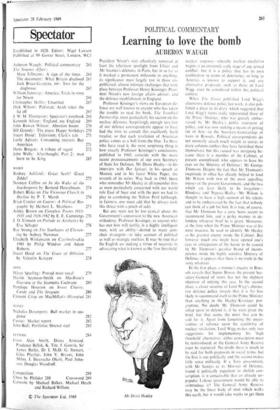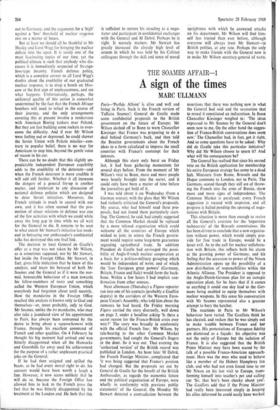Learning to love the bomb
POLITICAL COMMENTARY AUBERON WAUGH
President Nixon's visit effectively removed at least the television spotlight from Ulster and Mr Soamcs-s dilemma in Paris, but in so far as it marked a permanent milestone in anything, its significance must largely rest in those un- publicised, almost intimate exchanges that took place between Professor Henry Kissinger. Presi- dent Nixon's new foreign affairs adviser, and the defence establishment in England.
Professor Kissinger's views on European de- fence are well known to anyone who has taken the trouble to read his book, The Troubled Partnership, most particularly his section on the nuclear dilemma. Surprisingly enough very few of our defence correspondents appear to have had the time to consult this excellently lucid treatise, so that each revelation of American policy comes as a bolt from the blue. To those who have read it, the most surprising thing is how exactly Professor Kissinger's conclusions. published in 1965, coincide with the more recent pronouncements of our own Secretary of State for Defence, Mr Denis Healey—in his interview with Der Spiegel, in his speech at Munich and in his latest White Paper, the seventh of its series. Way back in 1965, those who remember Mr Healey at all remember him as most particularly concerned with our world role East of Suez and with the part we had to play in combating the Yellow Peril (although, in fairness, one must add that he always took this threat with a pinch of salt).
But one must not be too cynical about the Government's conversion to the new American orthodoxy. Professor Kissinger, as anyone who has met him will testify, is a highly intelligent man, with an ability—denied to many arm- chair strategists—to take account of political as well as strategic realities. It may be true that the English are making a virtue of necessity in advocating what is known as the low threshold'
Mr Denis Healey
nuclear response—whereby nuclear escalation begins at an extremely early stage of any armed conflict--but it is a policy that has its own justification in terms of deterrence, so long as America is known to support it, and any alternative proposals, such as those of Lord Wigg, must be considered within this political context.
When The Times published Lord Wigg's alternative defence policy last week, it also pub- lished a piece in its diary which suggested that Lord VX'igg's views really represented those of the Prime Minister, who was gravely embar- rassed by Mr Healey's public statement of policy. and was now seeking a means of getting rid of him—to the Secretary-Generalship of NATO in Brussels. Political correspondents do not normally attach much weight to stories in diary columns (unless they have furnished them themselves), but this canard was intriguing be- cause there is a member of the Cabinet, at present unemployed, who appears to have his eyes on the Ministry of Defence: Mr George Thomson. Despite the fact that Mr Thomson's ineptitude in office has already helped to land Mr Wilson with two of the most appalling messes of the present Government. and the two which are least likely to be forgotten— Rhodesia and Nigeria /Biafra—Mr Wilson is thought to have a high opinion of his talents and to be embarrassed by the fact that nobody can think of a job for him. It is true, of course, that Mr Thomson has a cosy Scots accent to recommend him, and a perky manner in de- fending whatever brief he is given. Moreover, at the time when the Prime Minister was at his most insecure, he used to identify Mr Healey as his greatest enemy inside the Cabinet. But however much one might have opened one's eyes in anticipation of the havoc to be caused by Mr Thomson's peculiar brand of incom- petence inside the highly sensitive Ministry of Defence, it appears that there is no truth in the story whatever.
In the first place. a minute's inquiry in Brus- sels reveals that Signor Brosio, the present Sec- retary-General of NATO, has not the slightest intention of retiring this year. In the second place. a closer scrutiny of Lord Wigg's alterna- tive defence policy reveals that it is far less likely to recommend itself to the Prime Minister than anything in the Healey/Kissinger pro- gramme. No doubt Mr Thomson could be relied upon to defend it, if he were given the
brief, but that seems the most that can be said for it. Apart from lamenting the uncer- tainties of reliance upon the credibility of nuclear retaliation, Lord Wigg makes only two suggestions for implementing his 'high threshold' alternative: either conscription must be reintroduced, or the General Army Reserve must be reprieved. No doubt there is much to be said for both proposals in social terms, but the first is out politically and the second makes little sense militarily. If a Tory government, with Mr Sandys as its Minister of Defence, found it politically expedient to abolish con- scription, is it conceivable that an already un- popular Labour government would be able to reintroduce it? The General Army Reserve may be the finest body of men which walks this earth, but it would take weeks to get them out to Germany, and the arguments for a 'high' against a low' threshold of nuclear response rest on a matter of hours.
But at least we should all be thankful to Mr Healey and Lord Wigg for bringing the nuclear debate into the open. It is surely one 'of the most fascinating topics of our time, yet the political climate is such that anybody who dis- cusses it is immediately suspected of Strange- love-type insanity. French defence policy, which is a complete answer to all Lord Wigg's doubts about the credibility of our graduated nuclear response, is to drop a bomb on Mos- cow at the first sign of unpleasantness, and see what happens. Unfortunately, perhaps, the unilateral quality of this action is somewhat undermined by the fact that the French Mirage bombers will need to refuel in the course of their journey, and the only arrangements covering this at present involve a rendezvous with American Boeing tankers over Poland.
But they are fast building some rockets to over- come the difficulty. And if ever Mr Wilson were feeling sad or depressed, he could shower the Soviet Union with Polaris missiles—con- trary to popular belief, there is no way for Americans to stop him, beyond the gentle voice of reason in his ear.
There can be no doubt that this slightly un- predictable independent European capability adds to the credibility of the deterrent—and when the French deterrent is more credible it will add still further. Whether it all increases the dangers of a general fry-up is another matter, and irrelevant to any discussion of national defence policies which are designed to deter Soviet initiatives. Moreover, the French attitude is much in accord with our own, and it has often seemed that the pro- motion of closer relations in defence was one of the few activities with which we could while away the long gap in time while we all wait for the General to die. It remains to be seen to what extent Mr Stewart's initiative last week- end in betraying our ambassador's confidential talks has destroyed this one frail link.
The decision to treat General de Gaulle's offer as a trap was not taken by Mr Wilson, as is sometimes supposed, nor by Mr Stewart, but inside the Foreign Office. Mr Stewart, in fact, gives little indication that he knew of this analysis, and treats his betrayal of both Mr Soames and the General as if it were the nor- mal, honourable behaviour of a man towards his fellow-members of NATO and something called the Western European Union, which everybody had forgotten about until recently.
How the mandarins in the Foreign Office reached this analysis is known only to God and themselves—or, more probably, only to, God.
Mr Soames, unlike the FO mandarins, who may also take a jaundiced view of his appointment to Paris, has always been consumed by the desire to bring about a rapprochement with France, through his excellent command of French and other qualities. On 4 February he thought his big moment had arrived and was bitterly disappointed when all the Hancocks and Greenhills far away used his achievement for the purpose of a rather unpleasant practical joke on the General.
If he had then resigned and spilled the beans, as he had every moral right to do, his account would have been worth a laugh a line. However, it now seems unlikely that he will do so, because the Foreign Office has allowed him to leak to the French press the fact that he was bitterly disappointed by his treatment at the London end. He feels that this is sufficient to restore his standing as a nego- tiator and participant in confidential exchanges with the General and M Debre. Perhaps he is right. It scarcely matters. Mr Stewart has greatly increased the already high level of esteem in which he was held by his Cabinet colleagues through the skill and sense of moral uprightness with which he answered attacks on his department. Mr Wilson will find him- self less trusted than ever before, although everyone will always trust Mr Stewart—in British politics, at any rate. Perhaps the only way to snake friends with the General now is to make Mr Wilson secretary-general of NATO.



































 Previous page
Previous page